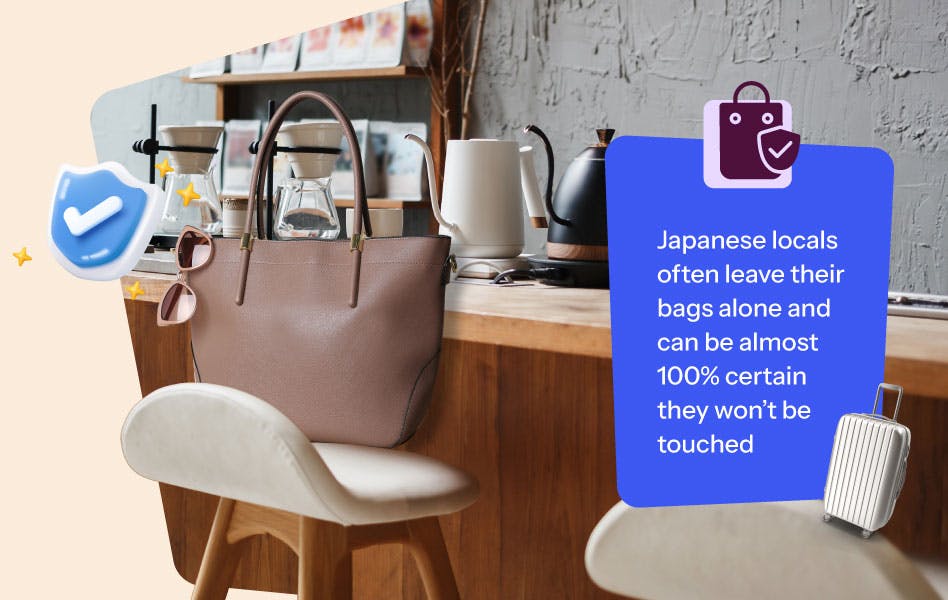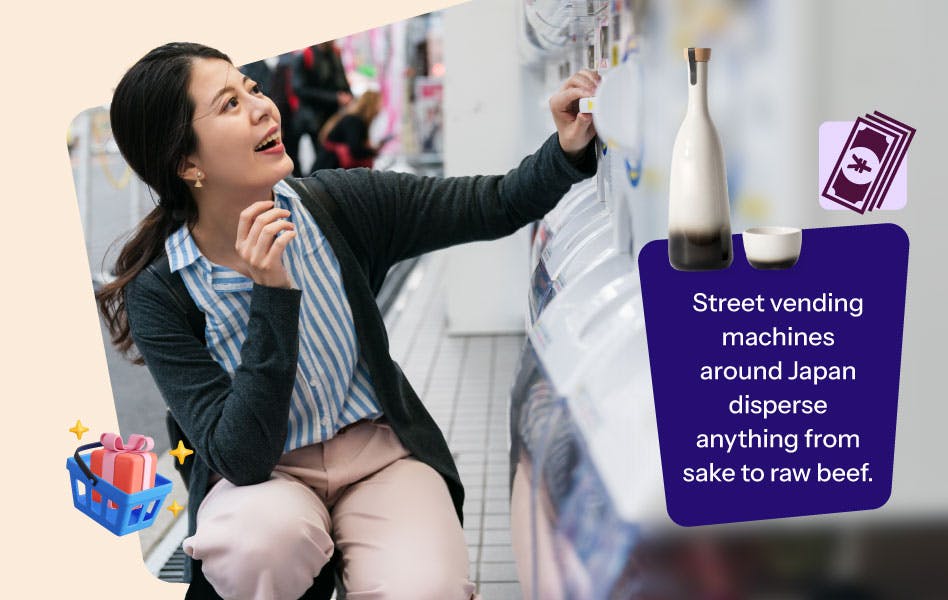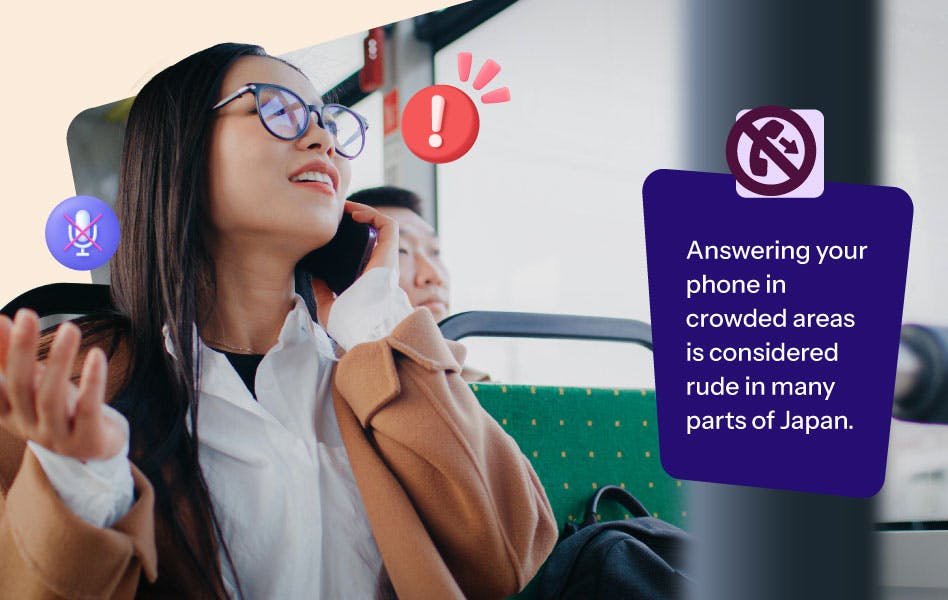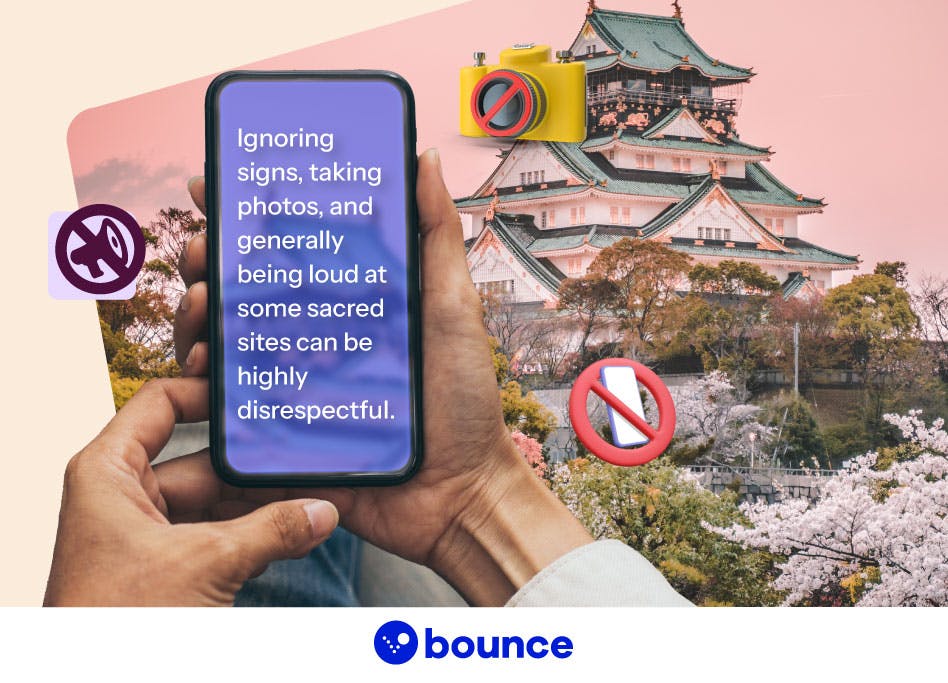Japan’s Etiquette Decoded

Japan is a fascinating destination known for its landscapes, culture, history, and food. While it has long been a top travel destination, understanding its unique cultural landscape has never been more essential.
With the great adventure Japan offers comes the responsibility of respecting local customs and culture. Taking the time to learn Japanese etiquette can help you maintain a deeper connection with the locals and enjoy a smooth travelling experience. In this research, Bounce has compiled traveler stories about their most surprising culture shocks in Japan..
The biggest culture shocks to tourists in Japan
We’ve scoured online forums and travel sites to find some of the biggest culture shocks tourists experience when travelling in Japan, from security to restaurants and vending machines.
1. Unattended valuables in public spaces
Get the app to unlock rewards

Book with the app and earn 10% back in Bounce credits. Every booking unlocks more credits for your next trip.
Scan to download


Many tourists may be shocked to see unattended bags and belongings left in coffee shops and restaurants, especially if you’re from a country where this would seem impossible. However, in Japan, there are fewer instances of pickpocketing and theft than in other countries. Many locals leave their bags alone for a while and can be almost 100% certain that they will remain untouched. This is often done at cafes to reserve seats while people order their food or beverages.
However, this is becoming less common on public transport and in central areas, as unattended luggage, especially around tourist areas, is viewed more suspiciously these days.
2. Prevalence of smoking indoors
Smoking cigarettes is common, even in enclosed indoor spaces. There are even smoking compartments on trains. Many travelers are surprised to find that some cities even allow smoking in restaurants and cafes, as well as shopping centers. However, most of these locations now have a separate space for smokers. In some cafes, smoking is allowed inside.
It’s worth noting that some cities like Tokyo have introduced restrictions on smoking indoors. Smoking outside is also not generally permitted except in designated areas. Some areas, like Shinjuku and Shibuya, have outdoor smoking sections, but smoking outside of these can result in a hefty fine.
3. Restaurant etiquette

While eating at a restaurant in Japan, you may notice people around you slurping. It is considered a way of showing respect and appreciation for good food. In other countries, people have been taught to eat quietly and be polite, so it can be a custom that some foreigners are unused to.
While attending company events and work meals, pouring your own drink may come across as rude. If someone fills your glass, it’s polite to offer to do the same back.
4. The need for cash
Japan is a cash-reliant society, although bank cards are becoming more widely accepted in larger cities like Tokyo, Osaka, and Kyoto. While many major stores and restaurants do accept international credit cards, it’s not always obvious which ones. Smaller shops, especially in rural areas, often operate on a cash-only basis, so it’s a good idea to carry sufficient yen when traveling outside cities.
In shops and restaurants, you’ll often encounter cash trays at the counter. Instead of handing money directly to staff, place it in the tray — this practice makes sure transactions are handled smoothly and respectfully.
5. No tips
Tipping is not a standard practice in Japan and can even be seen as inappropriate or unnecessary. Rooted in a culture that values respect, dignity, and professionalism, good service is considered part of the experience, with no extra reward expected. While Western influences are slowly introducing tipping in some areas, it’s still best to avoid offering tips to prevent potential misunderstandings.
In Japan, the cost of dining or enjoying a drink already reflects the value of exceptional service. Whether you’re at a restaurant, bar, or café, you can simply express your gratitude through polite words or a genuine "arigato gozaimasu" (thank you).
6. Number of vending machines

Anyone who has been to Japan will be able to tell you about the sheer volume of vending machines dotted around.
Many street vending machines disperse anything, from fresh fruit to sake shots. Some of these dispensers have gone viral, including a cake-in-a-can machine, a time capsule machine dispensing toys, and a ramen machine that serves Ippudo tonkatsu ramen in just 15 seconds. There are also treasure box machines, with the chance to win digital cameras, Nintendo switches, and headphones.
7. Onsen etiquette
Onsen, Japan’s renowned hot springs, are a cherished tradition celebrated for their relaxing and healing properties, thanks to the mineral-rich waters from volcanic activity. These communal bathhouses offer a unique opportunity to unwind, but there are specific customs to follow to ensure everyone can enjoy the experience.
To maintain the purity of the water, guests must bathe completely naked — something that might feel unusual to Western visitors but is entirely natural in Japan. Before entering the onsen, you’ll rinse off thoroughly in the designated shower area. Once inside, you’ll share the soothing waters with others of the same sex. While the idea of nudity may feel daunting at first, many find that it quickly becomes a freeing and memorable part of embracing Japanese culture.
Tourist behaviors that could annoy Japanese locals
It’s no secret that some tourists can give everyone a bad name, but knowing some of the common behaviors that can irritate locals can help you to avoid annoyances on your trip.
1. Answering your phone in public

Answering your phone in public is often seen as disruptive in Japan, where quiet and consideration for others are highly valued. Locals expect a calm, respectful atmosphere on a train, in a restaurant, or at a temple.
If you need to take a call, it’s best to step aside to a less crowded area and keep your voice low. This small effort shows cultural sensitivity and ensures you’re not inadvertently disturbing the harmony of those around you.
2. Eating while walking
Eating on the go is generally frowned upon in Japan, where meals are enjoyed thoughtfully and in designated spaces. Walking while munching, even on something as small as an onigiri, can be disrespectful, especially in busy areas or near sacred sites. Instead, pause to eat at a nearby bench or convenience store seating area.
3. Public displays of affection (PDA)

PDA, like hugging and kissing, is uncommon in Japan and may make locals uncomfortable. Modesty and discretion are key cultural values, especially in public spaces.
While a quick gesture of affection might feel natural to you, it’s worth being mindful of the local preference for more subdued behavior. While traveling in Japan, save your affection for private moments.
4. Not being aware of your environment
Japan is a country where social awareness is second nature. Standing in the middle of a busy walkway, talking loudly, or failing to follow crowd flow can disrupt the efficient and polite rhythm of daily life.
Whether you’re exploring bustling Tokyo station or a serene temple, stay attuned to your surroundings. Move to the side to check your map or keep conversations at a moderate volume.
5. Disrespecting sacred spaces

Sacred spaces, such as shrines, temples, and religious monuments, hold deep cultural significance in Japan. Behaviors like taking loud photos, stepping on areas meant for prayer, or ignoring signage can be seen as highly disrespectful. Before visiting, familiarize yourself with basic etiquette, such as bowing at the entrance and refraining from loud conversation.
How to navigate your visit to Japan
Cody Candee, CEO and Founder of Bounce, gives tips on traveling around Japan with respect and understanding:
“Traveling in Japan offers a unique opportunity to experience a culture deeply rooted in respect, harmony, and mindfulness. To make your visit enjoyable for you and the locals, it’s important to be aware of and adapt to Japanese customs and social norms. These practices not only enhance your travel experience but also demonstrate your appreciation for the country’s traditions.
“One key to blending in is being mindful of noise levels. Shouting in public or answering phone calls in crowded spaces can disrupt the calm atmosphere that Japanese people value.
“When dining, small gestures like using the chopstick rest (known as a Hashi Oki) and never leave them upright in your rice bowl. Personal space is another consideration. Standing too close or engaging in public displays of affection (PDA), such as holding hands, can make locals uncomfortable.
“Awareness of your environment is crucial. If the locals are quiet, match their tone and volume to show respect. Avoid taking photos of people without their permission, especially during traditional ceremonies or in rural areas. And don’t forget to acknowledge greetings or thank-yous from service staff — kindness and politeness go a long way in creating positive interactions.
“By adopting these practices, you’ll easily navigate Japan, leaving a positive impression as a thoughtful traveler.”
Get the app to unlock rewards

Book with the app and earn 10% back in Bounce credits. Every booking unlocks more credits for your next trip.
Scan to download


